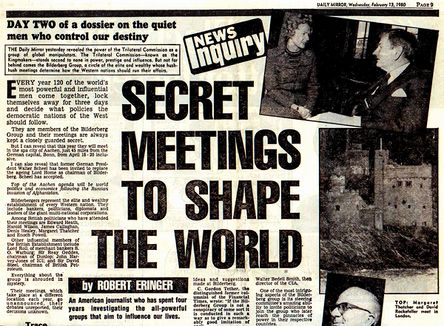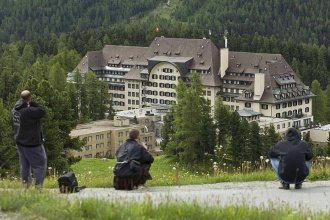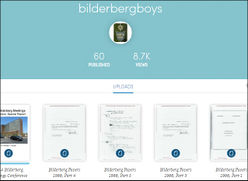Bilderberg/Exposure
(Exposure) | |
|---|---|
 A rare piece on the group byThe Daily Mirror, 13 February 1980, before the 1980 Bilderberg | |
| Particularly since the popularity of the WWW, the Bilderberg group has become more widely known, though commercially-controlled media generally continues to disdirect about the group. |
- Full article: Bilderberg/Exposure
- Full article: Bilderberg/Exposure
For most of its life, the Bilderberg has enjoyed a high level of secrecy, though not as much as other deep state milieu such as Le Cercle. When asked in March 1998 in the UK Parliament, UK Prime Minister Tony Blair denied that he or any members of his government had ever attended a Bilderberg meeting.[1]
In a candid moment, Blair later admitted attending the conference, terming it a "really useful group".[2]
Contents
Corporate media
In October 1955, Der Spiegel carried a major report on the "secret conference" of the "Bilderberg circle", even terming it a "conspiracy" (in quotes). It reported on attendees and the discussions. This appears to have been the trigger for a serious commercially-controlled media blackout, since the next time it was known to be mentioned by the corporate media was a short mention in a Washington Post article of 1963.[3] Occasionally, conferences were reported, such as in 1977[4] but a media blackout continued and until about 2005.
Internet
The internet proved an effective tool after campaigning journalists such as Jim Tucker and Tony Gosling (who registered Bilderberg.org)[5]) worked hard to publicise it. Guardian reporter Charlie Skelton started regularly reporting on the group in 2009 with an article entitled "Our man at Bilderberg: in pursuit of the world's most powerful cabal" in which he wrote that "a handful of people are saying, this weekend is Bilderberg".[6] By 2010, a lot of the secrecy surrounding the group had been eroded and other commercially-controlled media sources were reporting from the meetings. In 2011, BBC acknowledged a changing of the official narrative about the group, artfully entitling an article "Bilderberg mystery: Why do people believe in cabals?" - reframing the "mystery" associated with the group to speculation about the mental health of people who question its toxic nature.[7]
bilderbergboys
Beginning around 2014, a user named bilderbergboys began posting Bilderberg reports on Scribd. Markings on the documents indicate that they are from a range of sources, predominantly from library collections and archives.[8] These formed the basis of the material here about the Bilderberg meetings.
Public Intelligence
In 2016, the Public Intelligence website collated a large number of conference reports and miscellaneous associated documentation.[9][10]
Wikispooks
In 2017, Wikispooks collecte the available primary sources about the Bilderberg group, and published them at https://wikispooks.com/wiki/Bilderberg. Each of the 0 meetings was given its own page, as well each of the 3070 known guests.
References
- ↑ http://www.publications.parliament.uk/pa/cm199798/cmhansrd/vo980330/text/80330w06.htm
- ↑ http://www.youtube.com/watch?v=sQf2-3EiAxs
- ↑
{{URL|example.com|optional display text}} - ↑
{{URL|example.com|optional display text}} - ↑ http://Bilderberg.org
- ↑ https://www.theguardian.com/world/2009/may/13/in-search-of-bilderberg
- ↑ http://www.bbc.com/news/magazine-13682082
- ↑ http://www.conspiracyarchive.com/2016/06/30/the-bilderberg-papers-more-or-less-than-meets-the-eye/
- ↑ https://publicintelligence.net/bilderberg-archive/
- ↑ https://archive.org/search.php?query=subject%3A%22bilderberg%22

